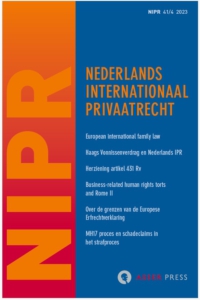New Private International Law Article published in the Journal of the History of International Law
Yesterday, a new private international law open access article was published online in the Journal of the History of International Law. It is titled: León Castellanos-Jankiewicz, “A New History for Human Rights: Conflict of Laws as Adjacent Possibility.” The abstract reads as follows:
The pivotal contributions of private international law to the conceptual emergence of international human rights law have been largely ignored. Using the idea of adjacent possibility as a theoretical metaphor, this article shows that conflict of laws analysis and technique enabled the articulation of human rights universalism. The nineteenth-century epistemic practice of private international law was a key arena where the claims of individuals were incrementally cast as being spatially independent from their state of nationality before rights universalism became mainstream. Conflict of laws was thus a vital combinatorial ingredient contributing to the dislocation of rights from territory that underwrites international human rights today.
It is worth noting that the author states that in the acknowledgement that: “An earlier version of this article was awarded the inaugural David D. Caron Prize by the American Society of International Law during its 2019 Annual Meeting held in Washington D.C.”

